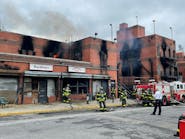I usually write about training topics, or operational issues and even the occasional morale booster. I usually don’t write about prevention of injury or illness as a main topic but I think we need to look at this flu thing seriously. Earlier this week I sat watching the local and national news about how flu season isn’t even here yet and some cities are declaring a health emergency. There are thousands of reports of several strains of the flu already out of control. Last night I sat and watched a training session and noticed the following. Several members came in complaining of "not feeling well," some were talking about the fact that someone in the house had the flu. There were three instances I noticed where someone coughed or sneezed and did not cover their mouth, and once I saw two firefighters drink after one another.
Firefighters and EMS personnel alike work in a strange (to most) environment anyway. In most cases those we work with are our second family in some cases our only family. We live together every third day or fourth day or whatever hours you work. We share sleeping quarters, bunks, showers and cooking areas across several shifts of people. We ride in the same vehicles day after day, use the same equipment when we train and respond to calls. Face it we have second homes that we are very comfortable in, with this in mind we may take short cuts in prevention of flu or disease without even thinking about it. While there is no cure for the common cold or the flu other than to let it run its course, we can help prevent it.
In looking at the firehouse, the number of specific areas of prevention for flu is infinite. Let’s look at the more common things we can do to lessen the spread and effect of the flu. First, understand how the flu is spread. According to the CDC the flu is primarily a person to person contact, meaning when a person with flu coughs or sneezes it produces droplets containing flu virus and those droplets are then inhaled by a second person. The CDC also states that while rare it is possible to transmit the virus by coming in contact with a surface where those droplets have landed or the flu host has touched. There are some agencies that state that surface transmission is not as rare so it’s best we take extra precaution.
What can we do to make the firehouse as flu-free as possible?
1. If you're sick stay home especially if you have the flu. There is no need to bring it to the firehouse.
2. Know the signs and symptoms of the flu. These include:
• Fever or feeling feverish/chills. Not everyone with the flu will have a fever.
• Cough
• Sore ThroatRunny or stuffy nose
• Muscle or body aches
• Headaches
• Fatigue (tiredness)
• Some people may have vomiting and diarrhea, though this is more common in children than adults.
3. Get your flu shot. According to the Centers for Disease Control (CDC) the flu vaccine can greatly reduce your chances of getting the flu. It further recommends all healthcare providers, public health officials, and first responders have the vaccine by the beginning of the season. This can help prevent you getting the flu and spreading it to your patients/customers, family or around the firehouse.
4. Be sure you clean the common areas of the station well some examples may be:
• Cooking areas
• Restrooms
• Bunk areas, be sure to change bed linens often and decontaminate bunks.
• Showers
• Door knobs
• Any areas that all members may come in contact with on a regular basis.
5. Do not share PPE.
6. Following training evolutions decontaminate items such as SCBA, Masks, tool handles.
7. If you feel like you may have the flu call your physician and get tested. If you are positive take measures not to pass it to others.
8. There is no substitute for common sense, just be aware its flu time.
Please take this information and give it some thought. Clean areas well and take care not to spread illnesses. The firehouse is your second home, treat as is good or better as you do your house. Read up on the flu and be informed about the virus. Visit the following sites for information:
Centers for Disease Control - Http://www.cdc.gov
US Department of Health and Human Recourses - http://www.flu.gov
Stay safe and prevent the spread of flu.





